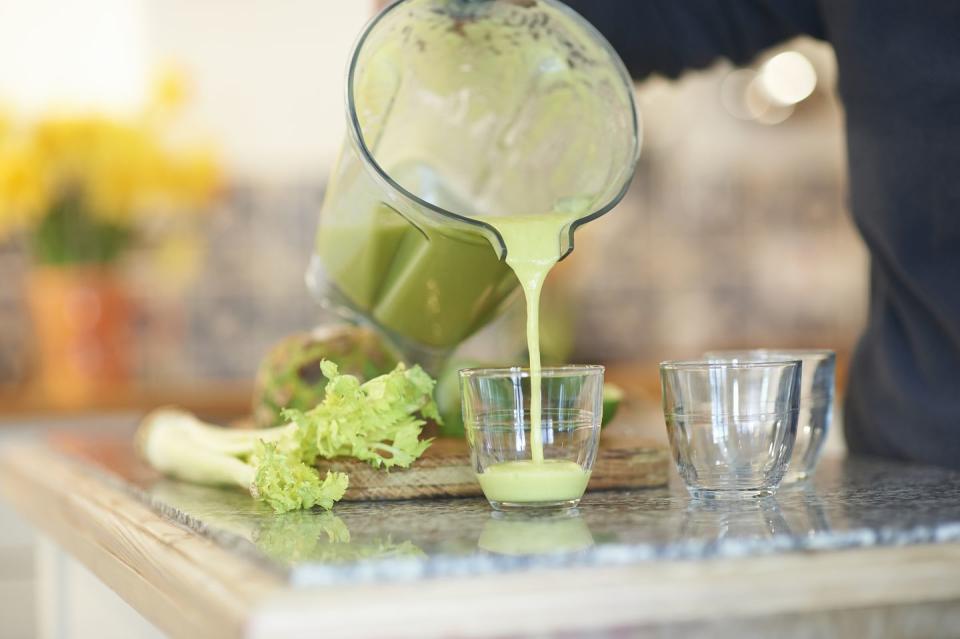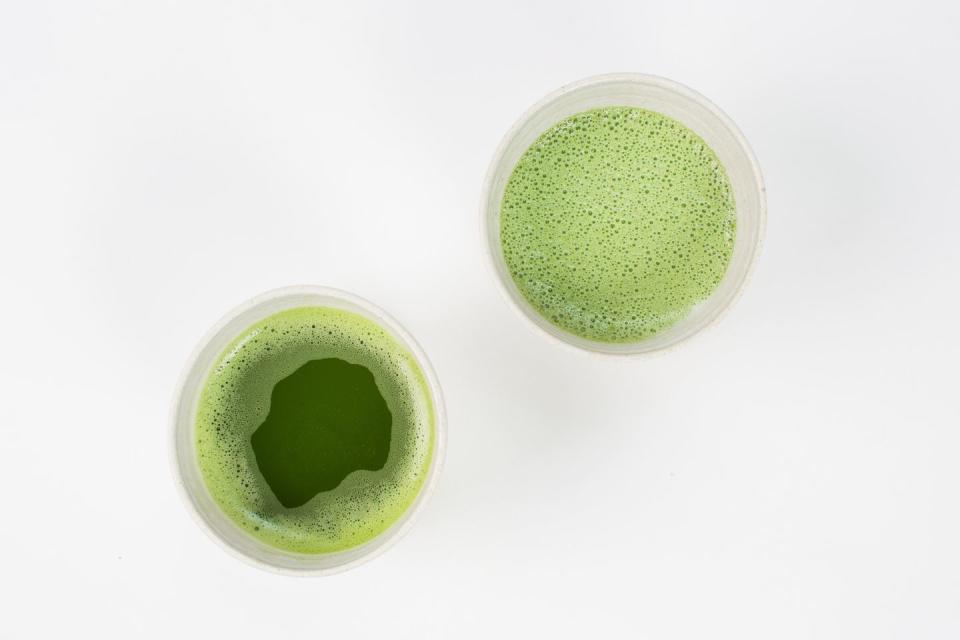Is celery juice good for you?

Celery juice is having its moment in the world of wellness and, of course, like many other fads, it’s supported by well-known celebrities.
The purported benefits of celery juice include slowing down the progression of Alzheimer’s disease, reducing blood pressure and lowering cholesterol, as well as playing a role in the prevention of cancer, obesity, thyroid issues and acne. However, many of these claims are dubious and lack the science to back them up. As is the case with all so-called ‘superfoods’, no single food has the power to prevent or cure disease.
Here, Rob Hobson, Head of Nutrition at Healthspan, separates fact from fiction, and reveals the true benefits of including celery juice in your diet.
Celery juice nutrition
Believe it or not, celery juice has a more concentrated nutrient profile compared with eating celery stalks, because of the removal of the fibre.
A glass (150ml) of celery juice is classed as one of your Five-a-Day (just one glass of juice counts, so make sure your other servings are whole fruits and vegetables).
Nutrition per 150ml celery juice:
Calories 24
Fat 0.3g
Saturated fat 0g
Carbs 5.7g
Sugars 3g
Fibre 1.8g
Protein 1.2g
Calcium 7% RDA
Magnesium 5% RDA
Phosphorus 5% RDA
Potassium 20% RDA
Vitamin C 11% RDA
Vitamin K – 44% RDA
Celery juice also contains a number of phytochemicals – most notably apigenin and luteolin – which act as antioxidants in the body.
Is celery juice good for you?
While there are some unfounded claims circulating about the benefits of celery juice, it is in fact good for you.
Here are some of the main benefits:
• Celery juice is a way of hydrating the body (as are all fluids).
• Compared with other fruit and vegetable juices, celery is lower in sugar – and excess sugar in the diet contributes to weight gain and poor dental health.
• Celery juice is low in calories.
• Celery juice contains a source of certain vitamins and minerals, which enable your body to work properly.
• Celery juice contains plant compounds that act as antioxidants and help to reduce inflammation in the body. Inflammation is though to be at the root of many diseases – this doesn’t mean celery juice can prevent specific diseases, but just that it contains compounds that help to reduce inflammation in the body.
• Celery juice is a good source of potassium, which is essential for fluid balance in the body. Potassium helps your kidneys to get rid of sodium through your urine, easing tension in your blood vessels. The NDNS survey shows that 11 per cent of men and 23 per cent of women don’t get enough potassium in their diet, which is likely due to the fact that only 30 per cent manage to eat Five-a-Day.

Celery juice: fact vs fiction
While, as you can see above, celery juice has many great health benefits, it’s important to be very wary of more extravagant claims relating to celery juice, as most of the research is done on rats and involves concentrated extracts of celery, not the juice.
For example:
Celery juice and high blood pressure
Research linking celery to high blood pressure has shown that a chemical called 3-n-butylphthalide (3nB) in celery seed extract has antihypertensive properties. One study, published in the Natural Medicine Journal, showed that consuming a capsule containing 75mg of celery extract twice daily for six weeks significantly reduced blood pressure. The authors of this study suggested that 3nB might reduce the build-up of fatty deposits within arteries and increase the elasticity of artery walls, which in turn may lower blood pressure. However, this was a pilot study and it involved celery seed extract, not celery juice.
Celery juice and Alzheimer’s disease
A study published in the journal Neural Regeneration Research looked at the effect of apigenin on Alzheimer’s disease. Researchers showed that this phytonutrient found in celery may help to limit damage to a number of brain processes, which may delay the progression of the disease. However, like a lot of research surrounding the purported health benefits of celery, this study was carried out on rats and the findings cannot be applied to humans. This research also involves celery leaf extract, not celery juice.
Celery juice and cholesterol
The link between cholesterol and celery has also been investigated using animal models. Research has shown that celery leaf extract may significantly reduce LDL (bad) cholesterol and that antioxidants in celery may also play a role by preventing stores of cholesterol from breaking down. Again, these are animal studies and the findings cannot be applied to humans. This research also involves celery leaf extract, not celery juice.
Is a celery juice cleanse safe?
While you may have seen your favourite Instagram influencer singing the praises of doing a celery juice cleanse or detox, be warned: these regimes are often developed by people who have no formal background in nutrition or medicine, and their popularity is often the result of celebrity involvement.
Despite the advice from health experts, people still turn to ‘detox’ regimes. These regimes are often used as a way of losing weight, but do nothing to instil healthy eating habits that help to keep the weight off long term. They are also used by some as a way of treating some sort of health complaint, but there is little research to back this up.
Some people view the notion of ‘cleansing’ as a way of ridding the body of toxins. However, the body functions perfectly well on its own, by way of your lungs, gut, liver and kidneys. Your lungs filter harmful substances in the air and your gut destroys parasites, while your kidneys and liver filter excess toxins and waste from the blood, releasing them in your urine. Starving yourself or embarking on regimes that involve consuming nothing but juices will not have any effect on this process.

However, following a juice cleanse in the long term could:
• Leave you depleted of essential nutrients, such as the B vitamins, which are water soluble and need to be topped up by the diet daily.
• Leave you feeling tired and lacking in the energy required to perform daily tasks, which could also impact on mood.
• See you lose weight in the short term, but you will be likely to put this back on afterwards as detox diets do nothing to instil healthy eating habits.
• Contribute to unhealthy eating behaviours, such as binge eating and yo-yo dieting.
The bottom line is that there is no real benefit to embarking on cleanses or detox programs – the science behind the claims doesn’t back them up and they do nothing to educate people on the basic principles of healthy eating.
How to make celery juice
If you’d still like to try making celery juice for its health benefits, enjoyed as part of a healthy, balanced diet, you can make one of two ways:
feed celery through a juicer.
Place chopped celery in a blender with water, then blitz until smooth. Place a piece of muslin over a bowl. Pour the mixture into the piece of muslin, then squeeze the juice through it.
Last updated: 12-10-2020
You Might Also Like

